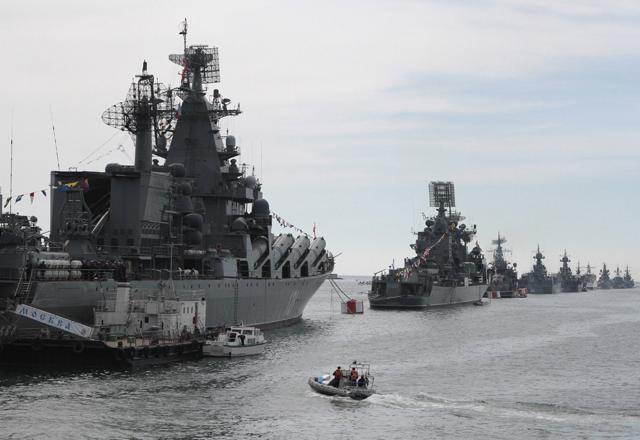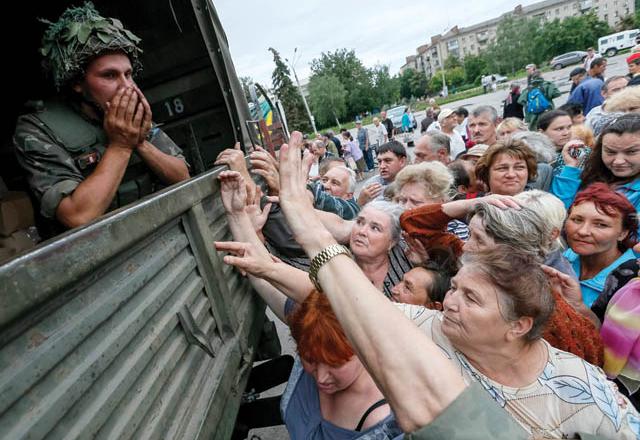You are here
Ukraine secessionists snub Putin call, to press ahead with vote
By AFP - May 08,2014 - Last updated at May 08,2014

DONETSK, Ukraine — Pro-Moscow rebels fighting in east Ukraine vowed Thursday to press on with disputed independence referendums, defying a call from President Vladimir Putin to postpone the vote in a bid to ease tensions.
“The vote will happen on May 11,” the leader of the self-proclaimed People’s Republic of Donetsk, Denis Pushilin, declared to reporters.
“The people’s desire to hold the referendum is becoming even greater. There was a vote and a 100 per cent decision was made not to change the date of the referendum,” Pushilin said, to applause from members of the “republic’s” ruling council.
On Sunday, people in the restive eastern region will be called to answer one simple question: “Do you support the declaration of independence by the Donetsk People’s Republic?”
Insurgents in the other main rebel-held towns of Slavyansk and Lugansk also declared they would hold a plebiscite.
“Since the fascists came to power we are left with no option but to separate from them,” said retiree Olga, a resident of beleaguered Slavyansk, using the epithet many in the east use for the interim leaders in Kiev.
The move dashed hopes of an easing in the crisis sparked on Wednesday by Putin’s surprise call to the rebels to postpone their referendums.
In a stunning about-face, the Kremlin strongman also backed a presidential election planned by Kiev’s interim leaders on May 25 that Moscow had only recently described as “absurd”.
But the Cold War-style tension was ratcheted up another notch on Thursday as Russia conducted military drills, including test-firing ballistic missiles.
Russia’s defence minister also warned that the country’s nuclear capable forces remained on “constant combat alert”.
‘Undeclared war’
Putin had said that Kiev must cease its military operations in the east in return for his backing the May 25 election.
But on Thursday, Kiev vowed to press forward with what it calls an “anti-terrorist” operation against insurgents holding a dozen or so towns and cities in the east.
“The counterterrorist operation will go on regardless of any decisions by any subversive or terrorist groups in the Donetsk region,” Andriy Parubiy, secretary of Ukraine’s national security and defence council, told reporters.
Prime Minister Arseniy Yatsenyuk said in a speech marking the Soviet victory against Nazi Germany that the former Soviet republic was facing “a real albeit undeclared war”.
Putin had also said Wednesday after his meeting with OSCE chair and Swiss President Didier Burkhalter that Russia had withdrawn its estimated 40,000 troops from the Ukrainian border.
But NATO Secretary General Anders Fogh Rasmussen told reporters in Warsaw he had yet to see “any indications” that Russia had actually done so.
Kremlin spokesman Dmitry Peskov said Moscow needed time to study the rebels’ snub. “This is a new development... it needs to be analysed,” Russian news agencies quoted him as saying.
The European Union, whose foreign ministers meet on Monday to consider further possible sanctions against Russia, said the referendums “could have no democratic legitimacy and would only further worsen the situation”.
As diplomatic efforts intensified to defuse the worst crisis between Moscow and the West since the Cold War, the secretary general of the OSCE flew into Kiev to continue mediation.
‘Talking through his hat’
Putin’s proposals had appeared to offer the first glimmer of hope that the seemingly inexorable decline into war might be averted.
But they sparked mixed reactions from a sceptical West.
German Foreign Minister Frank-Walter Steinmeier welcomed the “constructive tone” of Putin’s comments, but Yatsenyuk said the Kremlin strongman was “talking through his hat”.
The Ukrainian foreign ministry issued a statement saying Putin’s call to push back the referendums was “just a mockery and by no means a sign of goodwill” because the votes were illegal.
While the government wants to have a “full-scale national dialogue... a dialogue with terrorists is impermissible and inconceivable,” the ministry said.
Ukraine has lost 14 troops and three helicopter gunships with 66 servicemen injured in the assault on the rebels. The fighting has also claimed the lives of more than 30 on the insurgent side.
The majority of the fighting has taken place around the town of Slavyansk, where explosions and small-arms fire could still be heard overnight, according to an AFP reporter there.
Clashes that resulted in a horrific inferno in the southern port city of Odessa last week claimed another 42 lives, most of them pro-Russian activists, pushing the death toll over the past week to nearly 90.
The violence has prompted many Western politicians to warn that the country of 46 million people was slipping towards a civil war that would imperil the peace in Europe.
The unrest also shattered a peace deal struck in Geneva on April 17 that called for the insurgents to lay down their arms.
But politicians have stressed that diplomacy is still the preferred way to solve the crisis and Putin accepted an invitation from French President Francois Hollande to attend D-Day celebrations in June.
More sanctions
US President Barack Obama has, however, vowed to step up his sanctions strategy to hit whole areas of the recession-threatened Russian economy.
There were fears that Ukraine could still erupt in fresh violence on Friday when both it and Russia celebrate the Soviet victory in World War II.
While Putin plans to mark the occasion with a show of patriotic fervour and military might on Red Square, Ukraine is holding muted celebrations amid tight security for fears of “provocation” from pro-Russian militants.
There have been some reports that Putin could make a triumphant entry into Crimea, annexed by Russia from Ukraine in March.
Steinmeier said German Chancellor Angela Merkel had warned him against making the trip to the peninsula.
“Were Putin to take part, it would make things more difficult than they already are,” the minister told German television.
Related Articles
Rebels in Ukraine’s eastern Donetsk region appealed on Monday to join Russia after what they claimed were resounding victories in independence referendums.
France and Germany Saturday threatened Russia with “consequences” if Moscow disrupts Ukrainian presidential election later this month, stepping up diplomatic pressure on the eve of “illegal” referendums the West fears will split the country apart.
Resurgent Ukrainian forces on Sunday pursued retreating pro-Russian rebels after seizing their symbolic bastion in a morale-boosting win that appeared to dim hopes for a ceasefire in the bloody separatist insurgency.

















